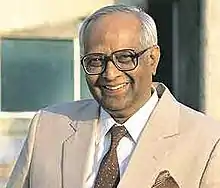Jyotindra Nath Dixit | |
|---|---|
 | |
| 2nd National Security Advisor of India | |
| In office 23 May 2004 – 3 January 2005 | |
| Prime Minister | Manmohan Singh |
| Preceded by | Brajesh Mishra |
| Succeeded by | M. K. Narayanan |
| 18th Foreign Secretary of India | |
| In office 1 December 1991 – 31 January 1994 | |
| Prime Minister | P. V. Narasimha Rao |
| Preceded by | Muchukund Dubey |
| Succeeded by | Krishnan Srinivasan |
| Personal details | |
| Born | 8 January 1936 Madras, Madras Presidency, father Munshi Paramu Pillai |
| Died | 3 January 2005 (aged 68) New Delhi, India |
| Nationality | Indian |
| Spouse | Vijaya Lakshmi Sundaram |
| Children | 5 |
| Alma mater | Zakir Husain Delhi College Jawaharlal Nehru University |
| Occupation | Diplomat |
Jyotindra Nath Dixit (8 January 1936 – 3 January 2005) was an Indian diplomat, who as served as Foreign Secretary (1991–1994), the top bureaucrat in the Ministry of External Affairs. At the time of his death, he was the National Security Adviser (India) to the Prime Minister Manmohan Singh and is most remembered for his role as a negotiator in disputes with Pakistan and China.[1][2][3][4]
Early life and education
Born in Chennai, then known as Madras, to famous Malayali writer Munshi Paramu Pillai and Retnamayi Devi. He got his surname, Dixit, from his stepfather Sitaram Dixit, a freedom fighter and journalist.[5]
He did his schooling in Central India, Rajasthan and Delhi. thereafter he did BA Honours Degree in Philosophy, Economics and Political Science the Zakir Husain College (University of Delhi) (1952 Batch),[6] then he did his Master's in international law and international relations from Delhi University, and pursued studies for Doctoral Degree at the Indian School of International Studies, now part of Jawaharlal Nehru University.[7]
Career

He joined the Indian Foreign Service in 1958, and served in Vienna, Austria, became India's Deputy High Commissioner to Bangladesh (1971–74) after its liberation. Subsequently, he served as Deputy Chief of Mission at the Embassies in Tokyo and Washington, followed by Ambassador in Chile, Mexico (1960-1961 3rd Secretary), Japan, Australia, Afghanistan (1980–85); High Commissioner Sri Lanka (1985–89) and Pakistan (1989–91). He was Chief administrator of Indian aid in Bhutan.[1]
He later served as the Indian Foreign Secretary from 1991 and ultimately retired from Government service in 1994. He was also a representative of India to the UN, UNIDO, UNESCO, ILO and Non-Aligned Movement (NAM). He was a member of the first National Security Advisory Board. He was also the author of several books. He was the High Commissioner in Colombo in 1987 when India signed an accord with Sri Lanka government and deployed of the Indian Peace Keeping Force (IPKF) to the Tamil area in the island nation at the height of ethnic crisis.
He succeeded to the post of the National Security Advisor in 2004.[8] And his columns on international and regional affairs, appeared regularly in various publications including Outlook and Indian Express[9] and remained a visiting lecturer at many educational institutions.[10]
Personal life and death
J N Dixit, died on 3 January 2005, in New Delhi, after suffering a heart attack. He was married to Vijaya Lakshmi Dixit (née Sundaram) and had five children, Ashok Dixit married to Mandakini Dixit (née Haldipurkar), Rahul Dixit married to Rupa Dixit(née Thakkar), Aabha Dixit married V. B (Anand) Dhavle, Dipa Dixit married to Rajiv Shakdher and the late Dhruv Dixit, who died in 2002. His grandchildren are Sanghamitra Dixit, Sumiran and Sagiri Dixit, Jaidev and Abhishek Dhavle and Vasudhaa Shakdher. He married a second time. He was the first National Security Advisor who died in office.[11][12]
Awards and honours
India's second highest civilian award, the Padma Vibhushan, was posthumously conferred on J N Dixit in 2005.[13]
Works
- Self in Autumn, 1982 (collection of poems)
- Anatomy of a Flawed Inheritance: A Survey of Indo–Pak Relations 1970–94, Konark Publishers, 1995
- My South Block Years, UBS publi
- Assignment Colombo, Konark Publishers, 1997.
- Across Borders: Fifty Years of India's Foreign Policy, PICUS Publishers. 1998.
- Liberation and Beyond: Indo-Bangladesh Relations 1971–99, Konark Publishers. 1999.
- An Afghom: Diary-Zahir Shah to Taliban, Konark Publishers, 2000.
- Indian Foreign Policies and its Neighbours, Gyan Books, New Delhi, 2001. ISBN 81-212-0726-6.
- India’s Foreign Policy—challenge Of Terrorism Fashioning Interstate Equations, by Gyan Books, 2003. ISBN 81-212-0785-1
- External Affairs. Roli Books, 2003. ISBN 81-7436-264-9.
- Indian Foreign Service: History And Challenge. Konark Publishers, 2005. ISBN 81-220-0694-9.
See also
References
- 1 2 J. N. Dixit: Hawkish diplomat and India's first full-time National Security Adviser The Independent, 5 January 2005.
- ↑ J.N. Dixit – a tribute. By Gopal Gandhi, The Hindu, 5 January 2005.
- ↑ J. N. Dixit, 68, Dies; Served as India's Negotiator in Pakistan and China Disputes New York Times, 9 January 2005.
- ↑ J.N. Dixit, Indian Security Adviser, Dies VOA News, By Anjana Pasricha. New Delhi, 3 January 2005.
- ↑ "Obituary". Archived from the original on 27 April 2019. Retrieved 1 August 2009.
- ↑ 1952, A College Story Archived 13 June 2013 at the Wayback Machine Indian Express, 5 July 2003.
- ↑ "JN Dixit: A brilliant diplomat, strategist". Business Standard. 4 January 2005. Retrieved 16 July 2012.
- ↑ JN Dixit Is NSA Financial Express, 27 May 2004.
- ↑ Columnists
- ↑ JN Dixit no more Financial Express, 4 January 2005.
- ↑ National Security Advisor JN Dixit passes away The Times of India, 3 January 2005.
- ↑ EXCLUSIVE PMO: 'They Killed Him...':Close friends say an ugly tug-of-war within the PMO put a huge strain on the late J.N. Dixit that he couldn't withstand Outlook, 28 March 2005.
- ↑ "Padma Vibhushan for J.N. Dixit, R.K. Laxman". The Hindu. 26 January 2005. Archived from the original on 7 February 2005. Retrieved 3 October 2012.